Some final words as Director of Inspire
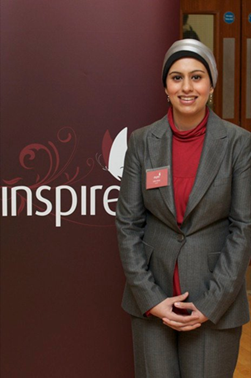
As I wrote in my very first Inspire blog back in 2010, the reason why Inspire was created was borne out of a sense of sheer frustration. In 2007, a small group of us as women activists met in Slough. Recognising the reality of gender inequality in all aspects of our society, we shared our deep resentment with the lack of work being done by many of the larger and “representative” Muslim organisations. We had every right to say and come to this conclusion because we had spent years trying to implement positive change in organisations like Young Muslims UK, the Islamic Society of Britain and the Muslim Council of Britain. We knew just how bad the problem was because many of us from that small group were the ones appointed to senior positions in those very organisations.
The pushback, denial and lack of will to address gender inequality reached a personal boiling point for us; we could no longer tolerate such blatant attitudes and practices. I could not stomach any longer being told to accept the status quo or the argument I heard the most often, usually being made by men, “you must have patience with your situation” and “we must first eradicate Islamophobia, that is the priority – only then can we address gender discrimination and abuse.” A straw man argument if I ever saw one, which also ignored that both issues are sometimes interlinked, as I elaborated in a Guardian piece in 2013.
Everyday in my role in these organisations, alongside the amazing stories of achievement, resilience and courage, Muslim women and girls would share stories of abuse, discrimination and attempts to eradicate their humanity, the extent of which, as I would discover, mainstream feminists struggled to comprehend. These stories sometimes left me awake at night. I will NOT tolerate or “have patience” to such gender injustice. To do so would be an act of injustice on my part.
Alongside this in the shadow of the London bombings we knew the problem of Islamist extremism within British Muslim communities was growing. Young activists had regularly been exposed to Islamist beliefs, preachers and the lionising of Islamist ideologues. Conflicting with my own egalitarian interpretation of Islam, the widespread active propagation of Islamist ideology in Britain perturbed me. Then 7/7 happened. I felt many of these organisations were not prepared to address extremism or gender inequality; despite being, what I call, the two elephants in the room.
So we did what female activists are so good at doing. Instead of waiting for men to take the lead, we rolled up our sleeves and did something about it ourselves. We set up Inspire. With no money. No resources. No manpower. No office. What we did have was an idea and something that even money can’t buy: commitment, a sense of burning injustice, thankless activism and the right to represent ourselves, our views and our voices, loudly and publicly. In those early days, turning Inspire from an idea into a tiny organisation was led by Tahmina Saleem and I. Both of us had been former Presidents of the female wing of Young Muslims UK – we’d already had years of experience of empowering women.
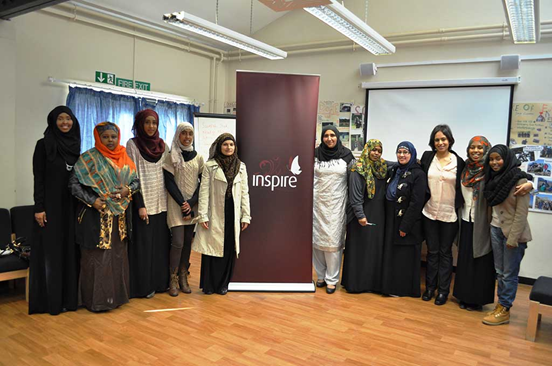
In the early years we approached a number of Muslim charities for potential funding. Many of these charities had a healthy bank balance, relying on the generous donations of ordinary British Muslims. We argued for support in the form of funding; addressing these two elephants in the room were critical issues for Muslims – the societal harm to Muslim children, families, women and even communities was evident. It was Muslims who were victims of both these societal problems. Nor did these issues help wider community cohesion in our country; on the contrary it undermined it.
Yet the charities turned us down. Both the issue of extremism and gender inequality were just too “controversial” for them they told us. I couldn’t help but see this as a lack of bravery, long term and visionary thinking and poor leadership; too much of wanting to be led as opposed to lead. Today however, there are a number of great organisations doing vital work who I support.
Back then though we refused to allow this to deter us.
Through local government funding and even private donations we ran yearly conferences and training programmes on gender equality and countering extremism often in partnership with local authorities. We began focusing on Islamist extremism long before the launch of our anti-ISIS campaign Making a Stand in 2014. As part of our counter-extremism programmes from 2008 onwards, we were already delivering sessions to Muslim women on the narrative of Al-Qaida inspired and other Jihadist ideology and taught vital theological counter-narratives to extremist ideology. We outlined how radicalisation took place, how women could safeguard their children and the vital role women play in tackling extremism.
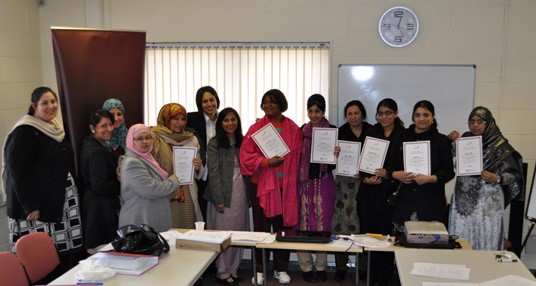
Whether we delivered our programmes over 2 weeks or 4, the response was the same. Hundreds of women felt empowered and confident – and as they told us in the vast majority of cases, no-one had ever taught or explained to them what Islamist extremism was. It was precisely the vast expertise we had built up over the years of delivering these programmes to Muslim women that equipped us to run our local programmes in 9 cities as part of Making A Stand.
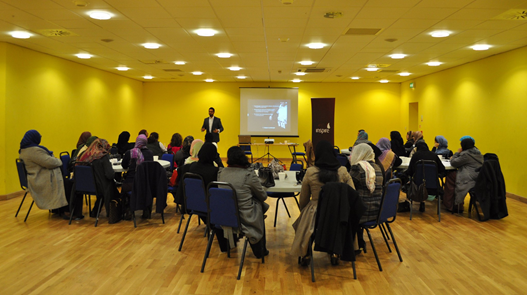
In 2010, angry at the deliberately provocative attempts by Al-Muhajiroun and Anjem Choudary to sow division in our society by threatening to take empty coffins through Royal Wooton Basset, a group of us decided to organise a memorial service for our Armed Forces at the National Memorial Arboretum. It was left to a small band of Muslim women to take the lead. The simple but poignant service which we organised with the Muslim Armed Forces Association included the laying of wreaths and was also attended by the mother of Lance Corporal Jabron Hashmi, whose British Muslim son had died fighting the Taliban in Afghanistan four years earlier.
Our motivation, as so aptly described by Kalsoom Bashir (who later became a co-director of Inspire), was simple:
“We are here as ordinary members of the community. We have come together as women to show our respect for those young men and women that have died serving our country. We want to show that the grief of a mother losing her son is shared, and that the loyalty of those who have been lost is remembered. There have been other organisations – that represent nobody – who have tried to hijack the message from UK Muslim communities. We are here to claim it back. There was a strong feeling of disgust in the Muslim communities that anyone would try to exploit the grief of families at Wootton Bassett. We thought that this was an appropriate way to show our respects.”
Despite the threats we received from some British Muslim extremists – both male and female – and the worries which plagued our minds about organising such a public service, we knew our contribution on that warm sunny afternoon in July was highly significant in not only undermining the narrative of both far right and Islamist extremists but in reinforcing the important role played by British Muslims in service to our country.
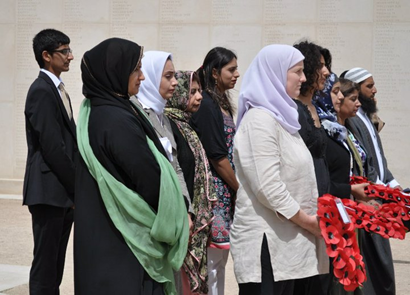
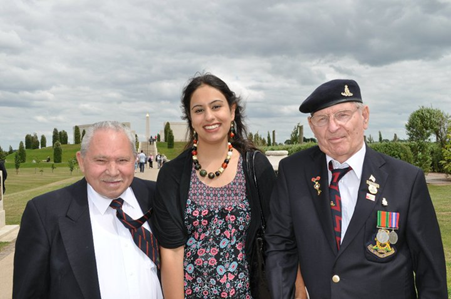
***
In the ten years I’ve served as director of Inspire there are far too many moments that I will cherish as I leave this organisation to recount. Despite our continuous struggle for funding over the years and the lack of manpower, quite simply we were punching above our weight compared to organisations three times our size. Our 2011 conference, Speaking in God’s Name: Re-examining Gender in Islam, attended by Khaled Abou el Fadl, Mukhtar Mai and others was a monumental success in pushing forward the boundaries of debate within Muslim communities about gender equality. At that same conference we launched our Jihad Against Violence campaign; the JAV declaration was signed by people from over 32 countries.
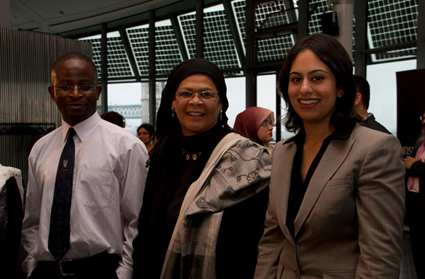
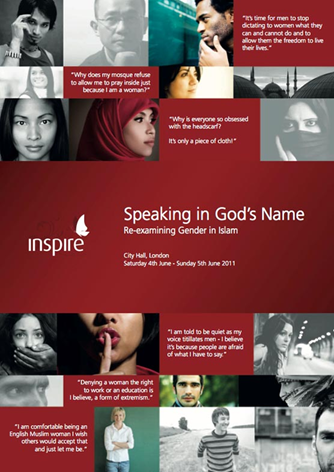
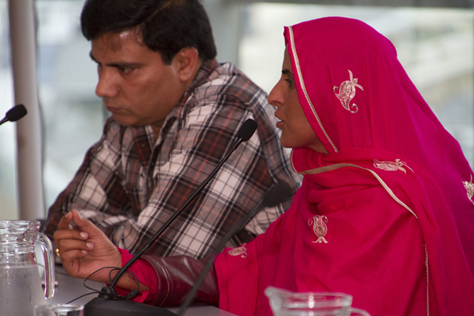
If fighting gender discrimination within minority communities was enough of a battle, I soon discovered that we also had to fight for our rights against British state institutions. I was outraged that having experienced enforced gender segregation at Muslim events in our country, these institutions which had a legal duty to uphold the Equality Act, were now prepared to forsake their obligations of gender equality in order to appease the demands of Islamists. Inspire bravely put its head above the parapet to voice our anger and to push back.
As has always been the case, our voices were minority ones. Universities UK in 2013 sought to approve gender segregated events on campus if that was to be requested by an Islamic speaker no matter how misogynistic he was. In 2014, the Law Society published a practice note which if left unchallenged, would have also discriminated against Muslim women. More recently Inspire in 2017 challenged the gender segregation policy of Al-Hijrah school, submitting expert evidence in partnership with Southall Black Sisters. We argued such a policy was a violation of the Equality Act 2010. Three Court of Appeal Judges agreed.
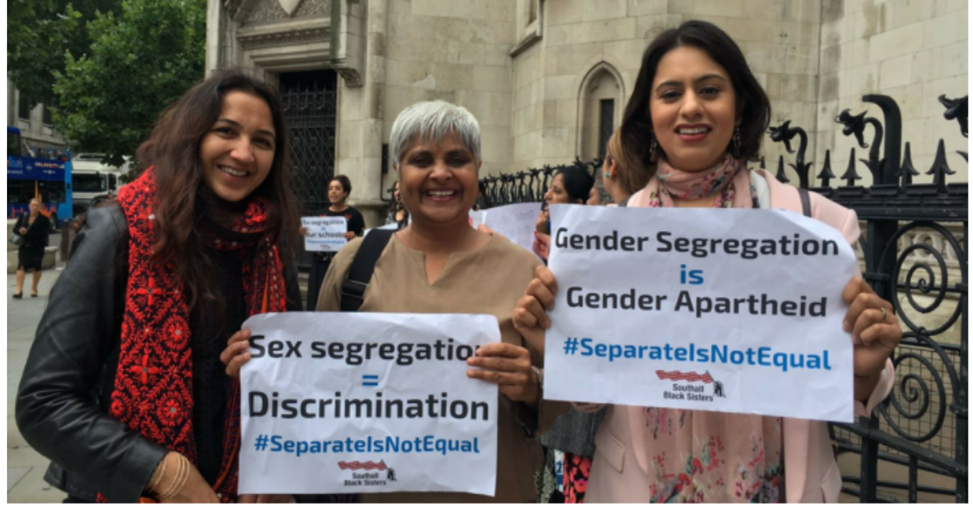
Each and every time we intervened, we, unlike our critics, proved that we were on the right side of history and even the law (Equality Act 2010). Yet each and every time we did put our head above the parapet we found ourselves in the firing line of a barrage of abuse, threats of violence, racial and religious bigotry and character assignations. We got the usual “get out of our country” bigotry from the far right, and while not acknowledged enough, we also received anti-Muslim abuse from the hard Left decrying us as “state-sponsored Islamophobes” and “token brown Muslim women.” As a Muslim human rights campaigner, a woman of colour and a victim of physical anti-Muslim attacks this was indefensible.
The overwhelming abuse however, came from Islamists and Muslim activist groups fixated with identity politics who threatened us and our children and who spread abhorrent lies about our characters in order to intimidate us into silence. They fuelled new and wild conspiracy theories about Inspire over and over again in an attempt to scupper our counter-extremism work.
The unfortunate truth was that Inspire, like so many – in an era of social media and fake news in our post-truth society – became a victim of these unfortunate times that dominate our world today. But it is precisely these dangerous conditions and our blind unwillingness to verify fact from fiction, which has allowed extremists of all persuasions to move from the fringes into the mainstream.
What my experience with Inspire has given me is a first hand insight into how extremists operate in our country today and the methodology they use to help normalise their toxic conspiratorial worldview within the mainstream. It has also shown me how extremists and their supporters purposefully target counter-extremism voices; and the lack of assistance and support these vulnerable voices receive from our authorities or civil society. I am determined, in particular, to redress this.
***
Being hemmed in from all corners, there were many times when we felt we couldn’t go on. It was physically, mentally and emotionally exhausting. Who would have thought for example running Making A Stand, an anti-ISIS campaign, (I repeat: an anti-ISIS campaign) which was supported by the Home Office would bring us so much backlash and abuse?
At that time, when hundreds of British Muslims were travelling to Syria and Jihadi John was beheading British aid workers, many were arguing that Muslims leaders needed to do more to speak out and challenge extremism. Vocal Muslim groups and politicians were arguing that the Government should be supporting and working with organisations in order to safeguard Muslim children. Mothers were telling us they feared their kids could be radicalised. Action was urgently required.
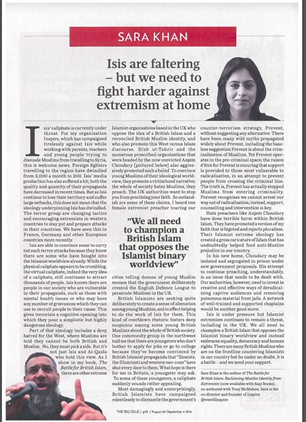
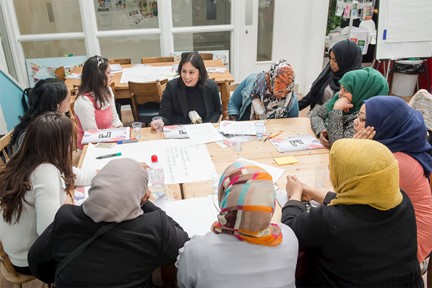
Having painfully discovered many charities were unwilling to fund such vital work, we decided to take the initiative ourselves and approached the Home Office in 2014 to fund and support our campaign.
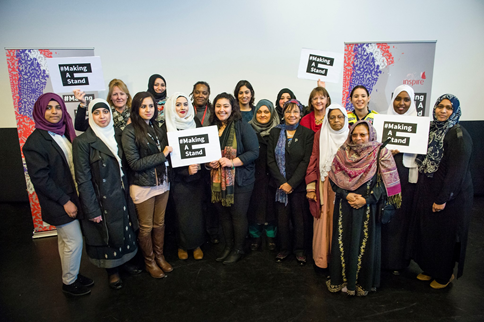
Yet despite this, we found ourselves being repeatedly denigrated and cast in a suspicious light by Muslim groups who themselves had done very little to counter extremism, or who once upon a time had themselves received Prevent funding. We found ourselves not only stuck between a rock and a hard place but between the hypocrisies of this wider debate.
Our MAS campaign and Home Office funding for that campaign ended in 2015. We did not receive any Home Office funding before or after that campaign. To our complete surprise, Inspire’s work was praised in a 2015 Number 10 Press release announcing the Government’s new Counter-Extremism strategy and fund of £5 million to help build a national coalition against extremism. Once again conspiracy theories and myths were abound. Our detractors claimed this was proof that we were and that we would be in receipt of millions of pounds of government funding. Yet we have never received a penny from the Home Office’s Counter-Extremism fund, and like many not for profit organisations – funding – throughout Inspire’s entire existence remained a constant struggle. Every year, we simply did not know if we would exist the following financial year. Operating on a shoestring, it hampered our ability to carry out the counter-extremism projects we were eager to deliver.
Yet despite this, Inspire regularly received a disproportionate level of abuse and focus compared to other organisations. I believe that all too frequently the true motive was a firm opposition to our values and beliefs: equality, human rights, a liberal and progressive outlook. All of which we see as being compatible with Islam. We were prepared to call out anti-Semitism, anti-Ahmaddiyah hatred, Islamist extreme groups and preachers and other forms of sectarianism and hatred. We were also prepared to stand up for women’s rights, gay rights and other minority rights. Nor did we hold an anti-Western or anti-state view and yes we were prepared to work with state and non-state agencies. This in particular enraged both hard Left and Islamist ideologues. It of course didn’t help that we were women who regularly voiced our “opiniated” views in the public domain! All of this made us the “wrong” kind of Muslim, and certainly the “wrong” kind of Muslim women – unworthy of support or defence. It was precisely this experience which inspired me to write The Battle for British Islam. While others often critiqued our work through the poorly constructed prism of “good Muslim/bad Muslim,” for me, Inspire’s prism quite simply, was human rights.
Despite the hard times I will forever look back at my time with Inspire as life-changing. I learnt much from women like Tahmina, Kalsoom, Yasmin and others who I had the fortune of working with directly. My conversations with Muslim women, men and young people in cities like Leeds, Burnley or Birmingham were always eye opening. The training I gave to thousands of teachers over the years and the real stories they shared with me always made me realise just how important counter-extremism work is and why it should be invested in. Frank and honest conversations with ordinary Brits over the years about their fears of Islamist extremism in their towns and cities, always made me sympathetic to the anxiety of helpless onlookers. Training I delivered to public bodies – and working groups I sat on, hammered home the huge challenges our authorities face in pushing back against extremism. The cries of help from parents who feared their children were vulnerable to radicalisation will forever live with me.
These are the ordinary people’s voices we don’t hear, we don’t pay attention to and frankly we don’t want to listen to. But during all the challenging times I endured with Inspire, it was precisely these people who encouraged me to continue struggling. And it was their lived experiences that encouraged me to keep on fighting.
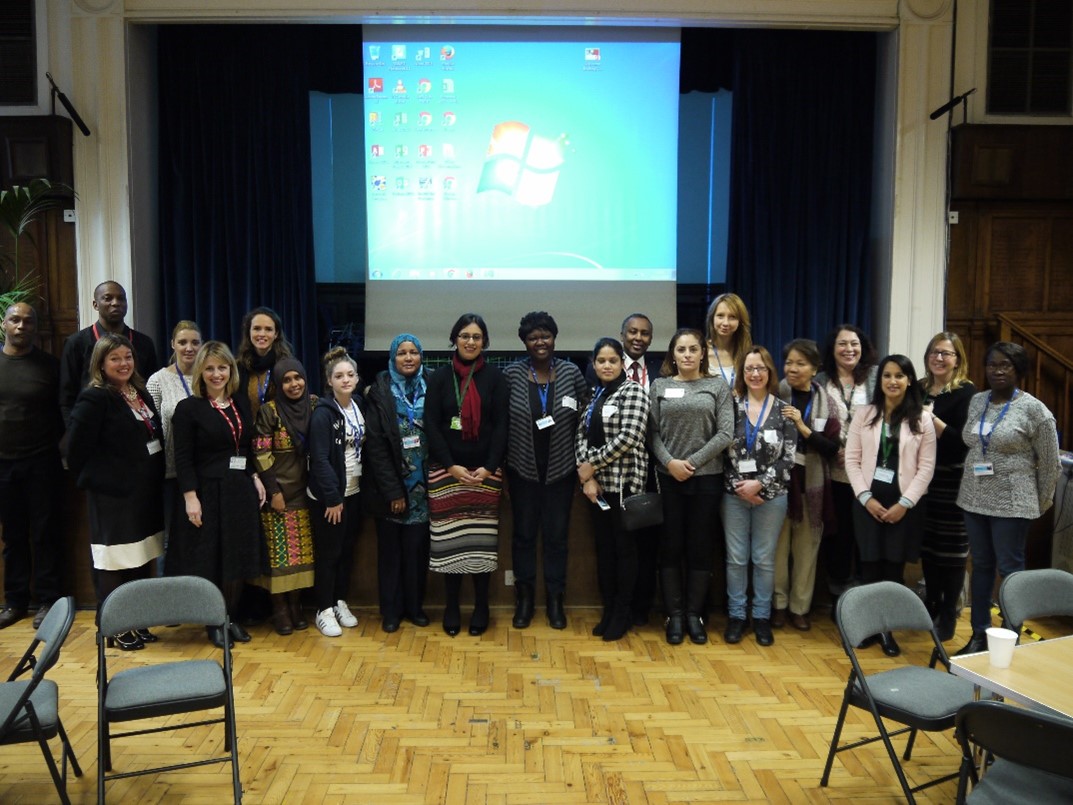
It has been an absolute pleasure to serve Inspire and as I move on and Inspire transforms into a charity, I wish the new board of trustees and the new team all the best for the future. I hope they develop Inspire further, transforming it into an even bigger and better organisation.
But to all our supporters, funders, donors, friends, mentors, colleagues and to each and every person who kept our spirit going either through words of encouragement, sharing a supportive tweet or fundraising for Inspire by running a marathon (!)– words will never be able to express my gratitude to each and every one of you. For your support, kindness and help; and often from complete strangers. In particular I would like to thank our funders: Sigrid Rausing Trust, Unbound Philanthropy, Barrow Cadbury, Mama Cash and all those Brits who set up monthly standing order forms. Inspire would not have survived as long as it did, had it not been for your core support and belief in the urgency of our work.
I could write pages and pages of the work and causes Inspire championed and delivered over the last ten years. But for anyone interested the Inspire website is a recorded account of some of our work and the issues we spoke out about.
***
It has been an honour; and the lived and eye-opening experience I gained during my time at Inspire will come in great use as I move on into my new role as Lead Commissioner of the Commission for Countering Extremism.
Thank you and till next time!
